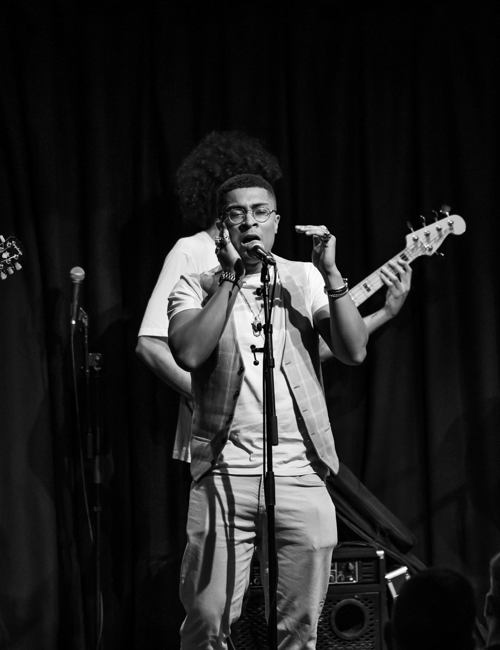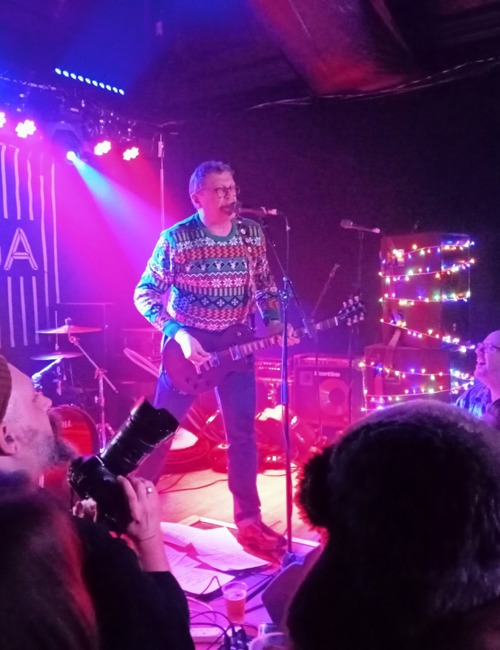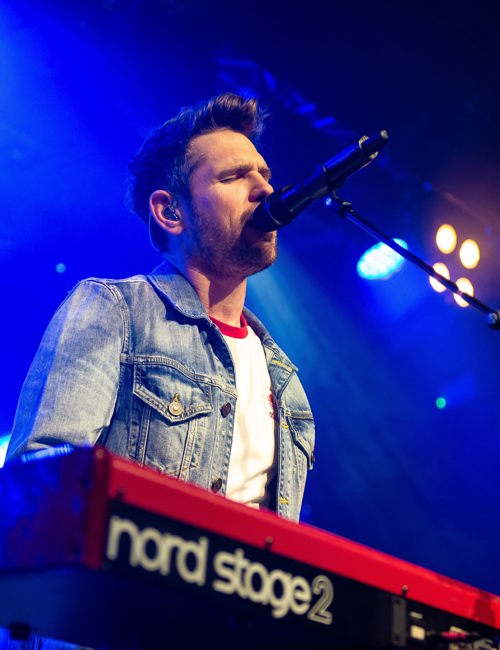Following the release of their second album Anywhere But Here, Sorry have firmly cemented themselves as a serious player in the tidal wave of strong new alternative bands in the UK. Ali Glen headed to Metronome to see how they fared in a live setting...

Sorry are yet another example of a band springing up from the now famous Brixton venue The Windmill who are cutting out their own path, with their claustrophobic, off-kilter songs. However, with all bands early in their careers, especially ones whose songs don’t follow traditional indie tropes, there is always a worry that they will have yet to figure out a way to translate these songs into the live setting.
Very quickly into the set, it became very apparent that this concern would be unfounded. Opening with Key To The City and Willow Tree, a pair off of the latest release, Sorry were successfully able to maintain the slight sense of unease these tracks convey on the album, without causing the energy amongst the crowd to dissipate.
This was in no small part thanks to Lincoln Bassett’s drumming, who gave the performances a freneticism that took the songs to a level of furore that doesn’t even permeate through the studio version. By the time an older favourite came along to follow up the strong start, in the form of their debut album 925’s single Right Round The Clock, Sorry had their audience firmly on side.
Sorry were successfully able to maintain the slight sense of unease these tracks convey on the album, without causing the energy amongst the crowd to dissipate
Sorry’s music has subverted expectations from the very beginning - long have they strayed into unusual genres for an upcoming group, drawing from their wide-ranging and sometimes unexpected list of influences. In many ways, their gigs are equally subversive, refusing to follow many of the conventions of live music.
For a start, the band was strikingly unspectacular in their clothing. Apart from Bassett, all the members wore hoodies for the duration of the set, at times with the hoods raised. This struck me as a way to minimise the personal glory of the performance, which was far more about the songs being played rather than the people playing them.
Supporting this theory was the absence of conversation on stage. Audience interaction between songs, a part of concerts that is so commonplace it is often completely unnoteworthy, was exceedingly sparing. Instead, disjointed, dystopian, unnerving audio clips punctuated the set, harbouring a claustrophobic atmosphere in the Metronome to allow the songs to thrive in an environment which suited them.
Audience interaction between songs, a part of concerts that is so commonplace it is often completely unnoteworthy, was exceedingly sparing
And thrive they did - from the naive and desperate optimism of new love in Let the Lights On, to the nihilistic observations of humanity featured on There’s So Many People That Want to Be Loved, Sorry deftly managed to weave together a set that ultimately rendered platitudes to the audience unnecessary.
This is, of course, not to say that the band were completely unaware of the people who they were playing to. In fact, they exemplified this wasn’t the case by playing Rosie, which frontwoman Asha Lorenz dedicated to a fan in the front row who had requested it.
Sadly, they also were conscious of a small but disruptive group in the audience who were persistently talking through the performance, an experience that has permeated through many a gig in recent times, and sparked debates as to whether audience behaviour has deteriorated since the return of gigging after the pandemic.
It was entirely welcome to see the band close with some of the tracks that made them their name
Whilst I admire the maturity of the band to plough through this disturbance, some part of me does wish that people such as this would be publicly called out and made accountable for behaviour that makes live music a less enjoyable experience for everybody else.
Nevertheless, Sorry didn’t let this detraction derail the show, rolling out all the best of the latest album, which the vast majority of the audience was hooked for. It is always a mark of a band on the rise when the new songs are received just as well as the oldies, and this was certainly the case for Sorry, with songs such as Closer receiving as much adulation as anything on the setlist.
That being said, it was entirely welcome to see the band close with some of the tracks that made them their name. As The Sun Sets and Starstruck reminded everyone of the impressive songwriting that made 925 such a head-turning debut, before digging even deeper into their early work, rewarding the fans who’ve been there since the very beginning with early single Lies.
It was an apt finale to the show and seemed quite befitting of Sorry’s position in the music industry. They are a band who are unafraid of acknowledging where they’ve come from but know that they are on what is a very deserved rise, especially if this show is anything to go by.
We have a favour to ask
LeftLion is Nottingham’s meeting point for information about what’s going on in our city, from the established organisations to the grassroots. We want to keep what we do free to all to access, but increasingly we are relying on revenue from our readers to continue. Can you spare a few quid each month to support us?




